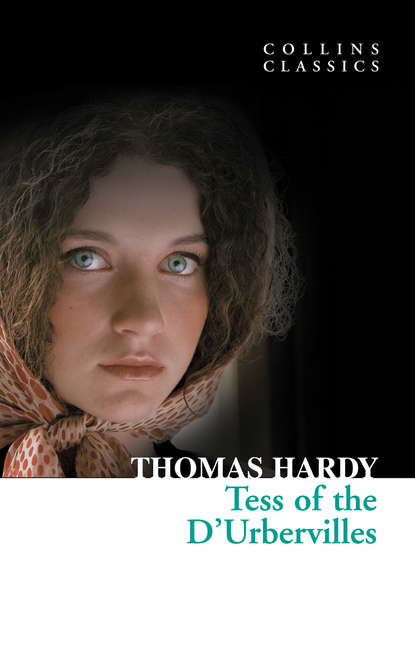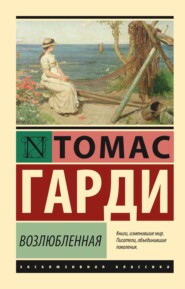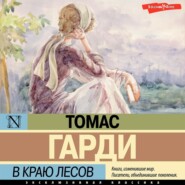По всем вопросам обращайтесь на: info@litportal.ru
(©) 2003-2025.
✖
Tess of the D’Urbervilles
Автор
Год написания книги
2019
Настройки чтения
Размер шрифта
Высота строк
Поля
Copyright (#litres_trial_promo)
About the Publisher (#litres_trial_promo)
Explanatory Note to the First Edition (#ulink_53d2b382-292f-53d9-8548-44fc12b42539)
The main portion of the following story appeared—with slight modifications—in the Graphic newspaper; other chapters, more especially addressed to adult readers, in the Fortnightly Review and the National Observer, as episodic sketches. My thanks are tendered to the editors and proprietors of those periodicals for enabling me now to piece the trunk and limbs of the novel together, and print it complete, as originally written two years ago.
I will just add that the story is sent out in all sincerity of purpose, as an attempt to give artistic form to a true sequence of things; and in respect of the book’s opinions and sentiments, I would ask any too genteel reader, who cannot endure to have said what everybody nowadays thinks and feels, to remember a well-worn sentence of St. Jerome’s: If an offence come out of the truth, better is it that the offence come than that the truth be concealed.
T. H., November 1891
Preface to the Fifth and Later Editions (#ulink_202ea186-5ec2-5e8c-aa67-f8ad549a853f)
This novel being one wherein the great campaign of the heroine begins after an event in her experience which has usually been treated as fatal to her part of protagonist, or at least as the virtual ending of her enterprises and hopes, it was quite contrary to avowed conventions that the public should welcome the book, and agree with me in holding that there was something more to be said in fiction than had been said about the shaded side of a well-known catastrophe. But the responsive spirit in which Tess of the d’Urbervilles has been received by the readers of England and America, would seem to prove that the plan of laying down a story on the lines of tacit opinion, instead of making it to square with the merely vocal formulae of society, is not altogether a wrong one, even when exemplified in so unequal and partial an achievement as the present. For this responsiveness I cannot refrain from expressing my thanks; and my regret is that, in a world where one so often hungers in vain for friendship, where even not to be wilfully misunderstood is felt as a kindness, I shall never meet in person these appreciative readers, male and female, and shake them by the hand. I include amongst them the reviewers—by far the majority—who have so generously welcomed the tale. Their words show that they, like the others, have only too largely repaired my defects of narration by their own imaginative intuition.
Nevertheless, though the novel was intended to be neither didactic nor aggressive, but in the scenic parts to be representative simply, and in the contemplative to be oftener charged with impressions than with convictions, there have been objectors both to the matter and to the rendering.
The more austere of these maintain a conscientious difference of opinion concerning, among other things, subjects fit for art, and reveal an inability to associate the idea of the sub-title adjective with any but the artificial and derivative meaning which has resulted to it from the ordinances of civilization. They ignore the meaning of the word in Nature, together with all aesthetic claims upon it, not to mention the spiritual interpretation afforded by the finest side of their own Christianity. Others dissent on grounds which are intrinsically no more than an assertion that the novel embodies the views of life prevalent at the end of the nineteenth century, and not those of an earlier and simpler generation—an assertion which I can only hope may be well founded. Let me repeat that a novel is an impression, not an argument; and there the matter must rest; as one is reminded by a passage which occurs in the letters of Schiller to Goethe on judges of this class: ‘They are those who seek only their own ideas in a representation, and prize that which should be as higher than what is. The cause of the dispute, therefore, lies in the very first principles, and it would be utterly impossible to come to an understanding with them.’ And again: ‘As soon as I observe that any one, when judging of poetical representations, considers anything more important than the inner Necessity and Truth, I have done with him.’
In the introductory words to the first edition I suggested the possible advent of the genteel person who would not be able to endure something or other in these pages. That person duly appeared among the aforesaid objectors. In one case he felt upset that it was not possible for him to read the book through three times, owing to my not having made that critical effort which ‘alone can prove the salvation of such an one.’ In another, he objected to such vulgar articles as the Devil’s pitchfork, a lodging-house carving-knife, and a shame-bought parasol, appearing in a respectable story. In another place he was a gentleman who turned Christian for half-an-hour the better to express his grief that a disrespectful phrase about the Immortals should have been used; though the same innate gentility compelled him to excuse the author in words of pity that one cannot be too thankful for: ‘He does but give us of his best.’ I can assure this great critic that to exclaim illogically against the gods, singular or plural, is not such an original sin of mine as he seems to imagine. True, it may have some local originality; though if Shakespeare were an authority on history, which perhaps he is not, I could show that the sin was introduced into Wessex as early as the Heptarchy itself. Says Glo’ster in Lear, otherwise Ina, king of that country:
‘As flies to wanton boys are we to the gods;
They kill us for their sport.’
The remaining two or three manipulators of Tess were of the predetermined sort whom most writers and readers would gladly forget; professed literary boxers, who put on their convictions for the occasion; modern ‘Hammers of Heretics’; sworn Discouragers, ever on the watch to prevent the tentative half success from becoming the whole success later on; who pervert plain meanings, and grow personal under the name of practising the great historical method. However, they may have causes to advance, privilege to guard, traditions to keep going; some of which a mere tale-teller, who writes down how the things of the world strike him, without any ulterior intentions whatever, has overlooked, and may by pure inadvertence have run foul of when in the least aggressive mood. Perhaps some passing perception, the outcome of a dream hour, would, if generally acted on, cause such an assailant considerable inconvenience with respect to position, interests, family, servant, ox, ass, neighbour, or neighbour’s wife. He therefore valiantly hides his personality behind a publisher’s shutters, and cries ‘Shame!’ So densely is the world thronged that any shifting of positions, even the best warranted advance, galls somebody’s kibe. Such shiftings often begin in sentiment, and such sentiment sometimes begins in a novel.
July 1892
The foregoing remarks were written during the early career of this story, when a spirited public and private criticism of its points was still fresh to the feelings. The pages are allowed to stand for what they are worth, as something once said; but probably they would not have been written now. Even in the short time which has elapsed since the book was first published, some of the critics who provoked the reply have ‘gone down into silence,’ as if to remind one of the infinite unimportance of both their say and mine.
In the present edition it may be well to state, in response to inquiries from readers interested in landscape, prehistoric antiquities, and especially old English architecture, that the description of these backgrounds in this and its companion novels has been done from the real. Many features of the first two kinds have been given under their existing names; for instance, the Vale of Blackmoor or Blakemore, Hambledon Hill, Bulbarrow, Nettlecombe Tout, Dogbury Hill, High-Stoy, Bubb-Down Hill, The Devil’s Kitchen, Cross-in-Hand, Long-Ash Lane, Benvill Lane, Giant’s Hill, Crimmercrock Lane, and Stonehenge. The rivers Froom or Frome, and Stour, are, of course, well known as such. And in planning the stories the idea was that large towns and points tending to mark the outline of Wessex—such as Bath, Plymouth, The Start, Portland Bill, Southampton, &c—.should be named outright. The scheme was not greatly elaborated, but, whatever its value, the names remain still.
In respect of places described under fictitious or ancient names—for reasons that seemed good at the time of writing—discerning persons have affirmed in print that they clearly recognize the originals: such as Shaftesbury in ‘Shaston,’ Sturminster Newton in ‘Stourcastle,’ Dorchester in ‘Casterbridge,’ Salisbury in ‘Melchester,’ Salisbury Plain in ‘The Great Plain,’ Cranborne in ‘Chaseborough,’ Cranborne Chase in ‘The Chase,’ Beaminster in ‘Emminster,’ Bere Regis in ‘Kingsbere,’ Woodbury Hill in ‘Greenhill,’ Wool Bridge in ‘Wellbridge,’ Hartfoot or Harput Lane in ‘Stagfoot Lane,’ Hazelbury in ‘Nuzzle-bury,’ Bridport in ‘Port-Bredy,’ Maiden Newton in ‘Chalk Newton,’ a farm near Nettlecombe Tout in ‘Flintcomb Ash,’ Sherborne in ‘Sherton Abbas,’ Milton Abbey in ‘Middleton Abbey,’ Cerne Abbas in ‘Abbot’s Cernel,’ Evershot in ‘Evershead,’ Tauton in ‘Toneborough,’ Bournemouth in ‘Sandbourne,’ Winchester in ‘Wintoncester,’ and so on. I shall not be the one to contradict them; I accept their statements as at least an indication of their real and kindly interest in the scenes.
January 1895
The present edition of this novel contains a few pages that have never appeared in any previous edition. When the detached episodes were collected as stated in the preface of 1891, these pages were overlooked, though they were in the original manuscript. They occur in Chapter X.
Respecting the sub-title, to which allusion was made above, I may add that it was appended at the last moment, after reading the final proofs, as being the estimate left in a candid mind of the heroine’s character—an estimate that nobody would be likely to dispute. It was disputed more than anything else in the book. Melius fuerat nonscribere. But there it stands.
The novel was first published complete, in three volumes, in November 1891.
T. H., March 1912
PHASE THE FIRST (#ulink_50c36f63-fd06-5405-b657-aa4afee8cde0)
CHAPTER 1 (#ulink_9b9bdd52-323f-51e9-b873-0413b7c93f0b)
On an evening in the latter part of May a middle-aged man was walking homeward from Shaston to the village of Marlott, in the adjoining Vale of Blakemore or Blackmoor. The pair of legs that carried him were rickety, and there was a bias in his gait which inclined him somewhat to the left of a straight line. He occasionally gave a smart nod, as if in confirmation of some opinion, though he was not thinking of anything in particular. An empty egg-basket was slung upon his arm, the nap of his hat was ruffled, a patch being quite worn away at its brim where his thumb came in taking it off. Presently he was met by an elderly parson astride on a gray mare, who, as he rode, hummed a wandering tune.
‘Good night, t’ee,’ said the man with the basket.
‘Good night, Sir John,’ said the parson.
The pedestrian, after another pace or two, halted, and turned round.
‘Now, sir, begging your pardon; we met last market-day on this road about this time, and I said “Good night,” and you made reply “Good night, Sir John,” as now.
‘I did,’ said the parson.
‘And once before that—near a month ago.’
‘I may have.’
‘Then what might your meaning be in calling me “Sir John” these different times, when I be plain Jack Durbeyfield, the haggler?’
The parson rode a step or two nearer.
‘It was only my whim,’ he said; and, after a moment’s hesitation: ‘It was on account of a discovery I made some little time ago, whilst I was hunting up pedigrees for the new county history. I am Parson Tringham, the antiquary, of Stagfoot Lane. Don’t you really know, Durbeyfield, that you are the lineal representative of the ancient and knightly family of the d’Urbervilles, that renowned knight who came from Normandy with William the Conqueror, as appears by Battle Abbey Roll?’
‘Never heard it before, sir!’
‘Well it’s true. Throw up your chin a moment, so that I may catch the profile of your face better. Yes, that’s the d’Urberville nose and chin—a little debased. Your ancestor was one of the twelve knights who assisted the Lord of Estremavilla in Normandy in his conquest of Glamorganshire. Branches of your family held manors over all this part of England; their names appear in the Pipe Rolls in the time of King Stephen. In the reign of King John one of them was rich enough to give a manor to the Knights Hospitallers; and in Edward the Second’s time your forefather Brian was summoned to Westminster to attend the great Council there. You declined a little in Oliver Cromwell’s time, but to no serious extent, and in Charles the Second’s reign you were made Knights of the Royal Oak for your loyalty. Aye, there have been generations of Sir Johns among you, and if knighthood were hereditary, like a baronetcy, as it practically was in old times, when men were knighted from father to son, you would be Sir John now.’
‘Ye don’t say so!’
‘In short,’ concluded the parson, decisively smacking his leg with his switch, ‘there’s hardly such another family in England.’
‘Daze my eyes, and isn’t there?’ said Durbeyfield. ‘And here have I been knocking about, year after year, from pillar to post, as if I was no more than the commonest feller in the parish…And how long hev this news about me been knowed, Pa’son Tringham?’
The clergyman explained that, as far as he was aware, it had quite died out of knowledge, and could hardly be said to be known at all. His own investigations had begun on a day in the preceding spring when, having been engaged in tracing the vicissitudes of the d’Urberville family, he had observed Durbeyfield’s name on his waggon, and had thereupon been led to make inquiries about his father and grandfather till he had no doubt on the subject.
‘At first I resolved not to disturb you with such a useless piece of information,’ said he. ‘However, our impulses are too strong for our judgment sometimes. I thought you might perhaps know something of it all the while.’
‘Well, I have heard once or twice, ’tis true, that my family had seen better days afore they came to Blackmoor. But I took no notice o’t, thinking it to mean that we had once kept two horses where we now keep only one. I’ve got a wold silver spoon, and a wold graven seal at home, too; but, Lord, what’s a spoon and seal?…And to think that I and these noble d’Urbervilles were one flesh all the time. ‘Twas said that my gr’tgrandfer had secrets, and didn’t care to talk of where he came from…And where do we raise our smoke, now, parson, if I may make so bold; I mean, where do we d’Urbervilles live?’
‘You don’t live anywhere. You are extinct—as a county family.’
‘That’s bad.’
‘Yes—what the mendacious family chronicles call extinct in the male line—that is, gone down—gone under.’
‘Then where do we lie?’
‘At Kingsbere-sub-Greenhill: rows and rows of you in your vaults, with your effigies under Purbeck-marble canopies.’
‘And where be our family mansions and estates?’

















